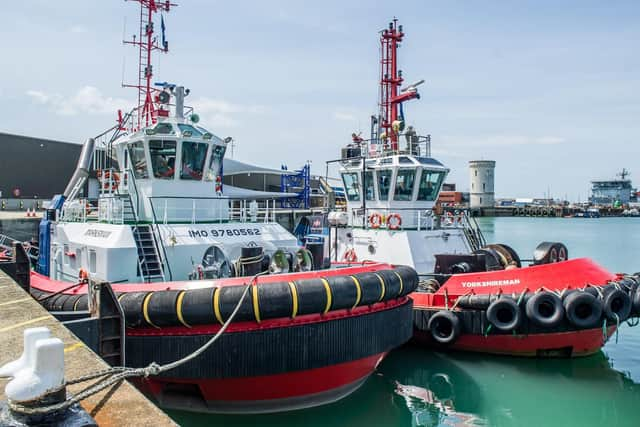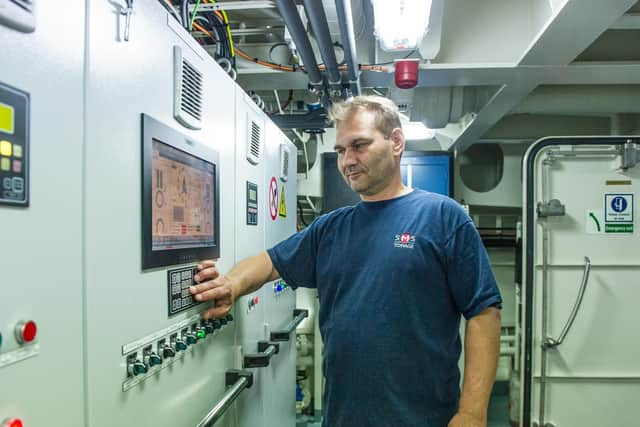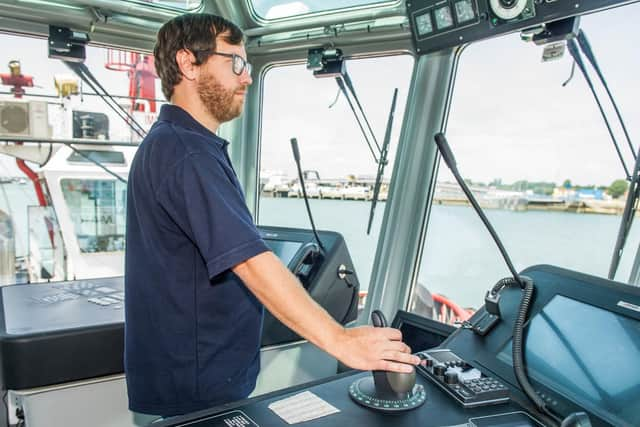Portsmouth Harbour's tug boats have mighty pulling power


Being a tug master is not for the fainthearted.
It requires great skill and concentration as the modestly sized tugs pull in vessels towering over them and up to 225 metres long before docking in Portsmouth Harbour.
But the size of the towage boats belies their incredible power.


Advertisement
Hide AdAdvertisement
Hide AdThe perfectly crafted vessels are not to be underestimated with them boasting two Caterpillar engines with horsepower of 5,700 and Rolls Royce propeller pods needed to guide home the array of commercial ships into the dock safely.
Tug masters play a pivotal role in the smooth functioning of the harbour and their work often goes unnoticed – but that’s how they like it. It is a skilled job in potentially hazardous conditions.
And when things do go wrong they are one of the first on scene to try and salvage the situation and save lives.
Lloyd Thompson, a tug master for SMS Towage, the UK’s largest independent towage company that has operated in the harbour since 2017, reveals the true nature of the job.


Advertisement
Hide AdAdvertisement
Hide Ad‘It can be dangerous,’ he says. ‘Especially when you are trying to get large vessels into the harbour in the middle of the night when it’s dark and the tug is going up and down because of the high winds and sea.
‘It is challenging and you have to think about what you are doing very carefully. There is a certain skill to it – there’s a lot to think about. If something goes wrong with a ship that you are towing in, like it losing power, then the tugs have to step in quickly.
‘Communication, control and speed are the most important things. You are on the radio communicating with the ship, letting them know what speed you are doing. You then drive over to the vessel but make sure you do not get too close.’
In January 2015, Lloyd had just started a new job with a previous employer and was part of a crew that leapt into action to help a giant cargo ship fitted with Land Rovers after it capsized off the Isle of Wight having lost stability.


Advertisement
Hide AdAdvertisement
Hide Ad‘The ship had turned on its side and was stranded in the water off the coast near Cowes,’ Lloyd says. ‘We helped get it back on an even keel and towed it into Southampton.
‘All the cars were under the water. There was a big salvage operation.
‘It’s not the sort of thing that often happens but the most important thing was to make sure no one was seriously injured and there was no pollution from the vessel.
‘In the end all the cars were auctioned off or sold for scrap. It was a strange way to start a new job.’
Advertisement
Hide AdAdvertisement
Hide AdOn another occasion a grounded 60ft training yacht suffered engine failure in Portsmouth Harbour and had to be recovered so the entrance could be reopened.
‘We managed to get out to the yacht quickly and establish a line before towing the yacht back to safety and made sure it didn’t end up going on to the beach by the Round Tower,’ he recalls.
The tugs boast a close-knit group made up of the master, a chief officer and an engineer.
Due to the demanding nature of the work there are strict regulations about the amount of time they work – with them able to work for 14 hours before having a 10 hour break.
Advertisement
Hide AdAdvertisement
Hide Ad‘We rely heavily on each other and are like family we spend so much time together,’ Lloyd says.
‘We work two weeks on and then have two weeks off. There is a strong emphasis on health and safety as it could be dangerous if you get things wrong.
‘There are a lot of security checks and checking the firefighter system, complying with audits and regulations.
‘People think we just sit around waiting for boats to come in but there is always so much stuff to do.
Advertisement
Hide AdAdvertisement
Hide Ad‘And there are plenty of jobs on the tugs that are needed to keep up to date with such as painting and maintenance checks.’
Fellow crew members all play vital roles in the running of the tug.
Roman Romanouski, who has worked as an engineer for 18 years on boats, says: ‘I carry out a lot of maintenance where I check things like the oil, cooling and fire systems,’ he said.
‘There is a lot of responsibility and you have to make sure everything is in proper working order. I love the job – I have a good life doing this.’
Advertisement
Hide AdAdvertisement
Hide AdChief officer Anthony White is training to become a tug master with him carrying out a number of tasks – including operating the winch when hauling in ships.
Anthony, who is also learning to drive a tug, said: ‘I practice driving the boat which is a lot harder than, for example, driving a car. It is more like driving a jet or a car on ice.
‘But just like driving a car, when you start to know where things are it becomes second nature and gets a lot easier.’
Lee Shaw, captain of the tug, said working and living on board means it is important to have the right chemistry between those on board.
Advertisement
Hide AdAdvertisement
Hide Ad‘We all get on well which is important but I have been on other vessels where that wasn’t always the case,’ he says.
‘This family atmosphere is important when you are out at sea for long periods, especially as you spend more time with your workmates than your loved ones.’ Lee adds: ‘You are also assessing the situation and if it is too dangerous or if visibility, for example, is poor then you just have to call it off and the ships have to wait.’
It is this judgement and skill in the face of danger which makes the tugs and the crew the unsung heroes of the harbour.